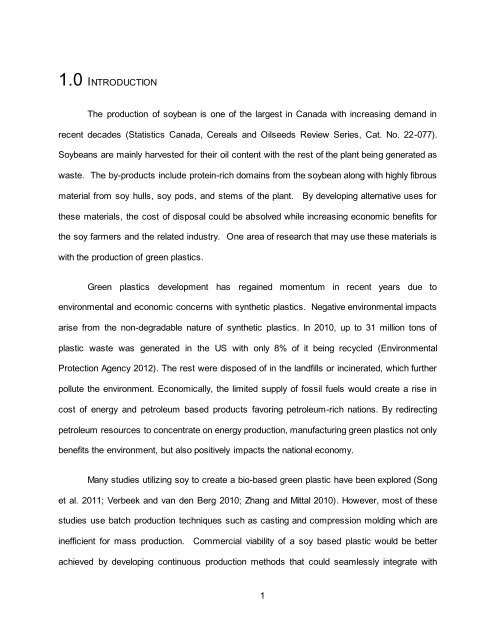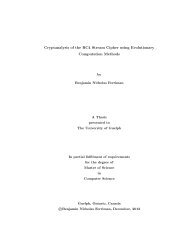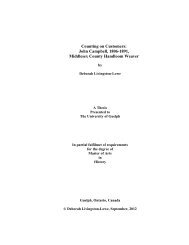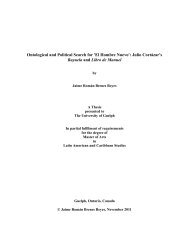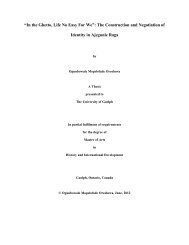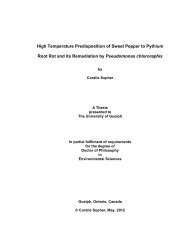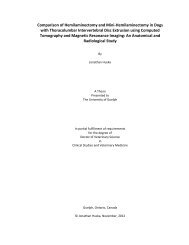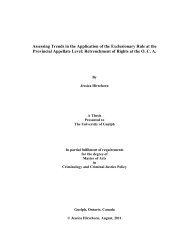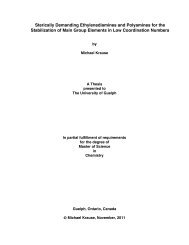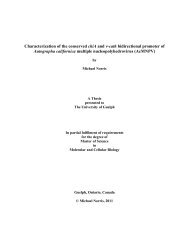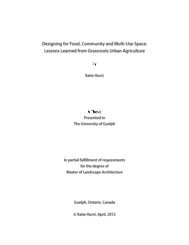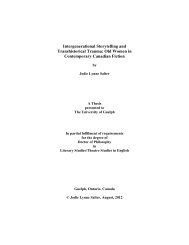THESIS - ROC CH ... - FINAL - resubmission.pdf - University of Guelph
THESIS - ROC CH ... - FINAL - resubmission.pdf - University of Guelph
THESIS - ROC CH ... - FINAL - resubmission.pdf - University of Guelph
Create successful ePaper yourself
Turn your PDF publications into a flip-book with our unique Google optimized e-Paper software.
1.0 INTRODUCTION<br />
The production <strong>of</strong> soybean is one <strong>of</strong> the largest in Canada with increasing demand in<br />
recent decades (Statistics Canada, Cereals and Oilseeds Review Series, Cat. No. 22-077).<br />
Soybeans are mainly harvested for their oil content with the rest <strong>of</strong> the plant being generated as<br />
waste. The by-products include protein-rich domains from the soybean along with highly fibrous<br />
material from soy hulls, soy pods, and stems <strong>of</strong> the plant. By developing alternative uses for<br />
these materials, the cost <strong>of</strong> disposal could be absolved while increasing economic benefits for<br />
the soy farmers and the related industry. One area <strong>of</strong> research that may use these materials is<br />
with the production <strong>of</strong> green plastics.<br />
Green plastics development has regained momentum in recent years due to<br />
environmental and economic concerns with synthetic plastics. Negative environmental impacts<br />
arise from the non-degradable nature <strong>of</strong> synthetic plastics. In 2010, up to 31 million tons <strong>of</strong><br />
plastic waste was generated in the US with only 8% <strong>of</strong> it being recycled (Environmental<br />
Protection Agency 2012). The rest were disposed <strong>of</strong> in the landfills or incinerated, which further<br />
pollute the environment. Economically, the limited supply <strong>of</strong> fossil fuels would create a rise in<br />
cost <strong>of</strong> energy and petroleum based products favoring petroleum-rich nations. By redirecting<br />
petroleum resources to concentrate on energy production, manufacturing green plastics not only<br />
benefits the environment, but also positively impacts the national economy.<br />
Many studies utilizing soy to create a bio-based green plastic have been explored (Song<br />
et al. 2011; Verbeek and van den Berg 2010; Zhang and Mittal 2010). However, most <strong>of</strong> these<br />
studies use batch production techniques such as casting and compression molding which are<br />
inefficient for mass production. Commercial viability <strong>of</strong> a soy based plastic would be better<br />
achieved by developing continuous production methods that could seamlessly integrate with<br />
1


